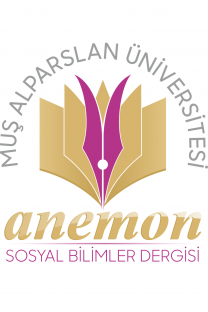Exploring The Relationship Between X and Y Generation Employees’ Fear Of Contracting Coronavirus And Their Holiday Purchase Intention
Kuşaklar, Kovid 19, Koronavirüse Yakalanma Korkusu, Tatil Satın Alma Niyeti
Exploring The Relationship Between X and Y Generation Employees’ Fear Of Contracting Coronavirus And Their Holiday Purchase Intention
___
- Abu Bakar, N. & Rosbi, S. (2020). Effect of Coronavirus disease (COVID-19) to tourism industry. International Journal of Advanced Engineering Research and Science (IJAERS), 7 (4), 188-193.
- Acar, Y. (2020). Yeni koronavirüs (covıd-19) salgını ve turizm faaliyetlerine etkisi. Güncel Turizm Araştırmaları Dergisi, 4 (1), 2020.
- Ahorsu, D. K., Lin, C. Y., Imani, V., Saffari, M., Griffiths, M. D. & Pakpour, A. H. (2020). The fear of COVID-19 scale: development and initial validation. International journal of mental health and addiction, 1-9.
- Atsız, O. (2021). Virtual reality technology and physical distancing: A review on limiting human interaction in tourism. Journal of Multidisciplinary Academic Tourism, 6 (1), 27-35. DOI: 10.31822/jomat.834448
- Bakioğlu, F., Korkmaz, O. & Ercan, H. (2020). Fear of COVID-19 and Positivity: Mediating Role of Intolerance of Uncertainty, Depression, Anxiety, and Stress. International Journal of Mental Health and Addiction. 1-14.
- Coşkun, R., Altunışık, R., Bayraktaroğlu, S. & Yıldırım, E. (2015). Sosyal Bilimlerde Araştırma Yöntemleri. (8. Baskı). Sakarya: Sakarya Kitabevi.
- Çalışkan, C. (2021). Sustainable tourism: Gen Z?. Journal of Multidisciplinary Academic Tourism, 6 (2), 107-115. DOI: 10.31822/jomat.2021-6-2-107
- Demir, M., Günaydın, Y. & Şen Demir Ş. (2020). Koronavirüs (Covid-19) salgınının Türkiye'de turizm üzerindeki öncülleri, etkileri ve sonuçlarının değerlendirilmesi. International Journal of Social Sciences and Education Research. 6(1), 80-107.
- Festing, M. & Schafer, L. (2014). Generational Challenges to Talent Management: A Framework for Talent Retention Based on the Psychological-Contract Perspective. Journal of World Business, 49, 262-271.
- Fetzer, T., Hensel, L., Hermle, J. & Roth, C. (2021). Coronavirus Perceptions and Economic Anxiety. The review of economic and statistics, 103 (5), 1-21.
- Gencer, N. (2020) pandemi sürecinde bireylerin koronavirüs (kovid-19) korkusu: çorum örneği. International Journal of Social Sciences Academy. 2 (4), 1153-1172.
- Gürbüz, S. & Şahin, F. (2018). "Sosyal bilimlerde araştırma yöntemleri (5. Baskı)", Seçkin Yayıncılık, Ankara.
- Kazkondu, İ. (2020) Türkiye’de yeme içme alışkanlıklarının kuşaklara göre değişimi. Doktora Tezi, Gazi Üniversitesi, Sosyal Bilimler Enstitüsü, Gastronomi ve Mutfak Sanatları Anabilim Dalı, Ankara.
- Kuşak kavramı ve tanımı. https: www.tdkterim.gov.tr (Erişim Tarihi: 07/02/2022).
- Karakus, Y. & Çamlıca, K. (2021). Evaluatıng and ımprovıng the destınatıon ımage through qfd-ahp ıntegrated method: example of cappadocıa. Revista Turismo Estudos e Práticas-RTEP/UERN, 10 (1), 1-17.
- Lorcu, F. (2015). Örneklerle Veri Analizi SPSS Uygulamalı. Detay Yayıncılık, 1.Baskı, Ankara.
- McCartney, G. (2020). The impact of the coronavirus outbreak on Macao. From tourism lockdown to tourism recovery. Current Issues in Tourism, 24 (19), 2683–2692.
- Newman, D. M. (2013). Sosyoloji Günlük Yaşamın Mimarisini Keşfetmek (Çev: Ali Aslan). Nobel yayınevi, Ankara.
- Okat, Ç. Özer, S. & Uçkan, Çakır, M. (2021). Koronavirüs günlerinde x ve y kuşaklarının gıda tüketimlerinin incelenmesi. University of South Florida M3 Center Publishing. 233-245.
- Onat, G., Karakuş, Y., Pimentel, T. D., & Doğan, Y. (2021). Antecedents of the Concept of Travel Intention During the Pandemic: A Case Study from Turkey/Antecedentes do Conceito de Intenção de Viagem Durante a Pandemia: Um Estudo de Caso na Turquia. ROSA DOS VENTOS-Turismo e Hospitalidade, 13 (4), 1-21.
- Pavlou, P. A. & Gefen, D. (2004). Building Effective Online Marketplaces with Institution-Based Trust, Information Systems Research, 15 (1), 37-59.
- Reza Farzanegan M., Gholipour F.H., Feizi M, Nunkoo R. & Eslami Andargoli A. (2021). International Tourism and Outbreak of Coronavirus (COVID-19): A Cross-Country Analysis. Journal of travel research. 60(3): 687–692.
- Soysal, G. (2020). Koronavirüs salgını ve yaşlılık. Eurasian Journal of Researches in Social and Economics (EJRSE). 7 (5), 290-301.
- Swarbrooke, J. & Horner, S. (2007). Consumer Behaviour in Tourism. (2nd ed.) Oxford: Elsevier, 60-75.
- Şeker, A. (2022). The nexus between tourism and international service trade in the coronavirus pandemic: Evidence from Turkey. Journal of Multidisciplinary Academic Tourism, 7 (1), 55-65. DOI: 10.31822/jomat.2022-7-1-55
- Şener, A. & YÜCEL, S. (2020). Sosyal medyanın Y kuşağı satın alma davranışları üzerindeki etkisi: Bir literatür incelemesi. Dumlupınar Üniversitesi Sosyal Bilimler Dergisi, (65), 265-284.
- Türk, O. (2021). Muş ilinin gastronomi turizmi potansiyeli ve swot analizi. Journal of International Social Research, 14 (77), 1203-1213.
- Twenge, J. M.; Campell, S. M.; Hoffman, B. J. & Lance, C. E. (2010). Generational differences in work values: leisure and extrinsic values ıncreasing, social and ıntrinsic values decreasing. Journal of Management, 36 (5), 1117-1142.
- UNWTO; Tourism and Coronavirus Disease (COVID-19). (2020). https://www.unwto.org/sustainable-development/resilience-of-tourism, (Erişim Tarihi: 30/12/2021).
- Washburn E. R. (2000). The five generations of American medical revolutions. Physician Executive, 26 (1), 54.
- WHO Health Topics, Coronavirus (2020). https://www.who.int/health-topics/coronavirus (Erişim Tarihi: 05/02/2022).
- Yenipınar, U. & Kardaş, K. (2019). Turizm rehberliği bölümleri müfredat geliştirme önerisi. Journal of Travel and Tourism Research, (14), 1-26.
- Yayın Aralığı: 3
- Başlangıç: 2013
- Yayıncı: Muş Alparslan Üniversitesi
An Eriksonian Reading of The Body by Hanif Kureishi: Integrity Versus Despair
A Social Network Analysis Overview of Turkish Political Communication Competition on Twitter
Use of Websites with Educational Content: A Study on Students of Sports Sciences
Yunus Emre KARAKAYA, Metin YILMAZ, Aykut ŞAHİN
Johan Huizinga’da Kültür Yapıcısı Olarak Oyun Kuramı Üzerine Bir İnceleme: “Squid Game”
GSYH, Kamu Harcamaları ve Kamu Gelirleri Arasındaki İlişkilerin Türkiye Örneğinde İncelenmesi
